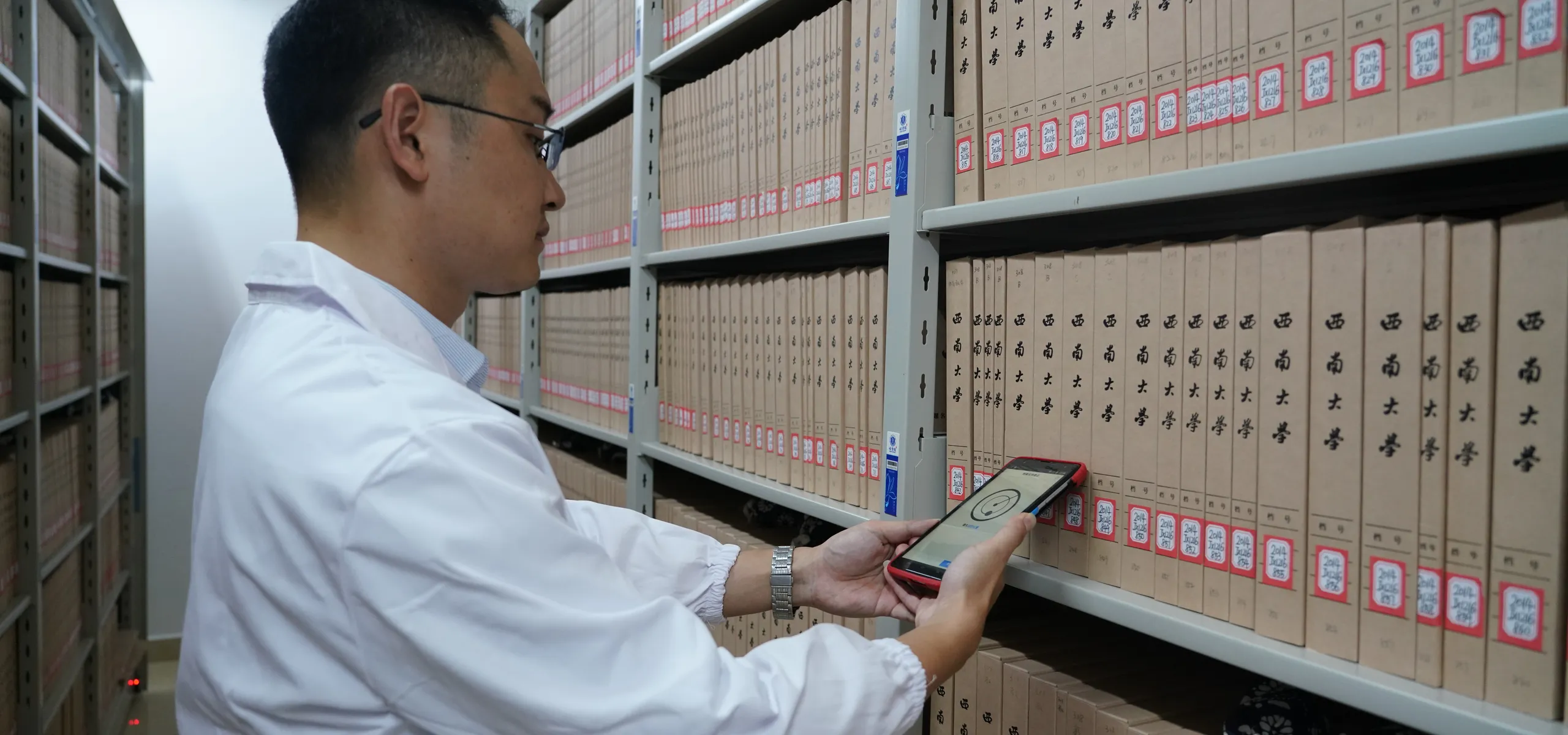Every Chinese worker has a “dang’an” (personnel file), but hardly anyone ever sees inside them
When 19-year-old Zhu Zhuanghong got a state-sector banking job in 1979, he thought he was set for life. Entering the People’s Bank of China as a “cadre”—a rank given to professionals and managers in state industries—he could look forward to lifelong job security, known in those days as an “iron rice bowl”; but in 1995, after Zhu left his job, he found that hardly anyone else would employ him.
It wasn’t until 12 years later that Zhu finally realized that his “personnel file,” or renshi dang’an (人事档案), was the cause of the trouble. In 2007, Zhu applied to work at China International Intellectech Corporation, a state-run human resources company, and was told they could find no documents to show how he got his previous two positions at the People’s Bank of China and the Industrial and Commercial Bank of China (ICBC), or to prove his status as a cadre. This made it impossible for them to hire him. Later, the lack of documentation also gave Zhu a lower pension than he was entitled to.
Everything had hinged on Zhu’s dang’an, the mysterious personnel file that every Chinese worker has, but few have ever seen. The file is typically created in primary school, and then transferred to a person’s high school, university, and employer. It records a raft of personal information: physical characteristics, date of birth, educational background, work experience, academic reports, professional credentials, political background (such as membership in a political party), records of any administrative penalties, and even assessments by past teachers and work supervisors.
Today, state-run enterprises still check these files when someone applies for a job with them, but most of the time a person’s dang’an lie sealed and filed away in the archives of local government human resources departments or universities.
“If there are some bad records in your file, it could probably affect your ability to transfer to another job [in the public sector],” says Wang Yuqing, who worked as a file manager dealing with dang’an in a Chinese university (which she didn’t wish to name) from 2009 to 2022. These personnel records fall under “security matters,” according to Wang, so the details of how they are categorized or used are strictly guarded by institutions that keep hold of them.
Reviewing the dang’an of current and potential employees is taken very seriously by Wang’s university. Last year, it reviewed all the files of the university’s “middle-ranking cadres” (mostly middle managers in administrative roles) to check they had the correct birth dates, length of service, work assessments, and salary records. If there was any information missing, the employee could face huge administrative hurdles in getting it replace. “If a file is lost or destroyed, it’s very difficult to get some materials reissued. One can only ask their work unit to issue some identifying document, which is just a substitute for the original,” says Wang.
The dang’an system of today developed fully during the 20th century, but keeping records of people’s employment history was hardly a new idea. As early as in the Shang (1600 – 1046 BCE) and Zhou (1046 – 256 BCE) dynasties, the nobility began to record the appointment and promotion of officials by inscribing bronzeware.
China’s first personnel file perhaps emerged in the Han dynasty (206 BCE – 220 CE), when the first emperor Liu Bang (刘邦) ordered candidates for officialdom to register at the chancellor’s office and have their “character (行),” “appearance (义),” and “age (年)” recorded.
During the Tang dynasty (618 – 907), a much more detailed employee record system emerged. The government created files for all applicants for official roles, recording their personal information, work experience, job performance assessments, and references. The files, known as jiali (甲历), were kept by various government departments in the capital in archives called jiaku (甲库). Even after they met all the qualifications, such as passing civil service exams, a person could only be hired as an official if their boss in the relevant department found their records satisfactory.
Today’s dang’an system took shape in 1940 when the Communist Party of China began creating files on Party members and established a “cadre office” to manage the information and ensure only the right people became members. The system slowly developed in the ’50s to also cover workers and students.
At that time, the personnel file was a powerful tool that could influence many aspects of one’s life. The state assigned people to work units that had a say in whether a person could marry, give birth, or even travel, and they would often consult the person’s dang’an when they made these decisions. During the Cultural Revolution, the family background and political records contained in the files were used to decide which individuals would be sent to carry out manual labor in the countryside, and which could instead get further education.
After 1980, as China’s market reforms gained pace, the dang’an system lost its significance. More and more people went to work in private companies, and employee files were no longer necessary when they started a career—only state-run work units are permitted to assess and store the files, so people working in the private sector don’t need to provide their dang’an when they change jobs. Today, most people’s dang’an are stored with the local Bureau of Human Resources and Social Security in the place where their household registration (hukou) is based.
The dang’an didn’t fade away, but there is little publicly available information on whether most files are still being updated, or who is updating them. For example, the human resources bureau of the city of Changsha, in Hunan province, requires college graduates to contact the dang’an office themselves if they want to update their files with their political background, employment records, and other information. “For getting one’s professional performance evaluation or a pension, the file is still useful even if you work at a private company,” says Wang.
Mr. Wen, a 60-year-old who retired from an education company this year, claims he suffers a reduced pension because part of his employee file that proved his work history before 1992 has gone missing. While his employment history after 1992 is recorded in China’s social security system (as everyone’s should be these days), the only record of his employment before that was in his dang’an.
Without it, “his working years were undercalculated, meaning his pension is reduced by a few hundred yuan every month,” Wen’s daughter tells TWOC. The family has tried to contact Wen’s former employer (which went out of business years ago) for help, but to no avail.
Sometimes, because of the dang’an’s secrecy, a personnel file can influence a person’s life without them knowing it. In 2002, Tang Guoji, a writer from Hunan province, received a phone call from the local education bureau asking him to go to the township government to fulfill some administrative procedures regarding his “mental disability.” Tang was shocked—this was the first time he had heard he had a mental disability. Finally, in 2003, he received a copy of his dang’an from an anonymous source and found his former college had identified him as “mentally ill” in a document.
Tang had graduated with good grades from Hunan Yiyang Teachers’ College in 1983, but struggled to find a school to hire him as a teacher. Now, he knew why. This document alleging he was mentally ill, perhaps based on just one of his teachers’ subjective opinions, likely buried Tang’s job prospects for good.
Later, Tang sued the college and the local education bureau for wrecking his reputation. But the case was dismissed by a court that effectively argued the college, as a public institution, had a right to make its own assessment.
Despite his failure to sue, Tang’s case triggered a discussion of whether the dang’an is still relevant in modern society. So far, though, most efforts to challenge the system have been in vain. In 2009, Zhu Zhuanghong sued ICBC to try and get his own lost social security contributions back from the company—he also lost.
While most people never see or hear much about their dang’an today, the file is still precious enough to create anxiety among those who need to use or change it. In June, a viral video on social media showed a senior high school graduate screaming hysterically after finding that her mother had opened her dang’an file, which she had obtained in order to forward to her future college or employer: If opened by an unauthorized person, the file becomes invalid, according to Chinese law (though in this case the girl’s mother was able to get the documents verified and resealed in two days).
Many people, including well-known TV broadcaster Bai Yansong, wondered how the graduate got her dang’an in the first place, since it’s quite rare for them to be given to individuals; however, none of the commenters online thought she was overreacting. Even among the young, the thought of having a secret file affecting one’s future chances for employment or pension, stored in some obscure government department or in a basement in a university, is enough to make anyone quake with anxiety.
Additional research by Yang Tingting (杨婷婷) and Tan Yunfei (谭云飞)
Inside the Secret Files China Still Keeps on Every Worker is a story from our issue, “Small Town Saga.” To read the entire issue, become a subscriber and receive the full magazine.












